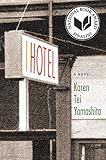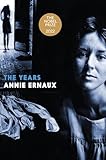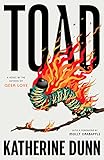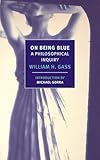Winter



Anne Carson, to me, is a winter poet. There is a wintry solemnity even to her most romantic works; the speaker is held at a remove, stilted (or perhaps jilted) by their desires. I began my year with Decreation, and devoted the rest of January to reading whatever the Brooklyn Public Library had of Carson’s oeuvre: Beauty of the Husband; Glass, Irony and God; and Autobiography of Red (which I ended up buying because the waitlist was several months long). It was a lot of poetry, but I never tired of Carson’s ability to induce emotional devastation in a single line: “Her voice sounded broken into. Where were you last night.” (Beauty of the Husband)
I fondly think of that winter as my “Carson period,” and her influence beyond the season has been undeniable. I began reading Samuel Beckett at her implicit behest (I’ve tried and failed to make progress on Molloy multiple times this year), and sought out many of her artistic and cinematic references. A writer once remarked that reading Carson is “a lifelong pursuit,” which I interpreted as a prophecy that I will have many more Carson winters.
Spring
 On the first unseasonably warm day in March (I remember because it was a high of 65 degrees), I finished Jhumpa Lahiri’s Whereabouts in a coffee shop. Inspired by Lahiri’s meandering portrait of urban solitude, I took an hour-long walk home.
On the first unseasonably warm day in March (I remember because it was a high of 65 degrees), I finished Jhumpa Lahiri’s Whereabouts in a coffee shop. Inspired by Lahiri’s meandering portrait of urban solitude, I took an hour-long walk home.
 I am not a monogamous reader. I often have a collection of poetry, essays, or short stories on hand while I’m progressing through a novel, but Karen Tei Yamashita’s I Hotel was an exception. The novel is an ambitious, genre-defying epic that reimagines the Asian American civil rights movement of the late 1960s and 1970s through a motley cast of characters, all with loose ties to San Francisco. I Hotel is titled in homage to the International Hotel on San Francisco’s Kearney Street, a historical site for Asian American political organizing. The book is told in 10 novella-like narratives, which function more as vignettes, about the activists, laborers, artists, students, and revolutionaries who were active during this period. I finished I Hotel on a flight from Texas, and distinctly remember staring out the window, stunned by the narrative feat that Yamashita had accomplished.
I am not a monogamous reader. I often have a collection of poetry, essays, or short stories on hand while I’m progressing through a novel, but Karen Tei Yamashita’s I Hotel was an exception. The novel is an ambitious, genre-defying epic that reimagines the Asian American civil rights movement of the late 1960s and 1970s through a motley cast of characters, all with loose ties to San Francisco. I Hotel is titled in homage to the International Hotel on San Francisco’s Kearney Street, a historical site for Asian American political organizing. The book is told in 10 novella-like narratives, which function more as vignettes, about the activists, laborers, artists, students, and revolutionaries who were active during this period. I finished I Hotel on a flight from Texas, and distinctly remember staring out the window, stunned by the narrative feat that Yamashita had accomplished.
 On a six-hour drive to Marfa, Texas, I began John Berryman’s 77 Dream Songs, the most challenging collection of poetry I’ve read to date. I read aloud some of the Dream Songs to my then-partner (who had lent me the book), and we marveled over Berryman’s lyrical genius and the rhythmic complexities of his stanzas.
On a six-hour drive to Marfa, Texas, I began John Berryman’s 77 Dream Songs, the most challenging collection of poetry I’ve read to date. I read aloud some of the Dream Songs to my then-partner (who had lent me the book), and we marveled over Berryman’s lyrical genius and the rhythmic complexities of his stanzas.
 My road trip through Texas made me nostalgic for the West, specifically California, so I thought it was a good time to start Jean Baudrillard’s America.
My road trip through Texas made me nostalgic for the West, specifically California, so I thought it was a good time to start Jean Baudrillard’s America.
Summer

 I had a month between jobs this summer, which left me with plenty of time to read. On a flight to Barcelona in June, I read Jay Caspian Kang’s The Loneliest Americans. Earlier that month, I was re-reading Theresa Hak Kyung Cha’s Dictee, an opaquely challenging, cerebral collection of poetry (if it can even be categorized as such) that demands immersion, not comprehension, from the reader. It was a jarring but purposeful juxtaposition, switching from Cha’s shadowy first-person verse, which is still unlike anything that’s published today, to Kang’s cogent contemporary analyses.
I had a month between jobs this summer, which left me with plenty of time to read. On a flight to Barcelona in June, I read Jay Caspian Kang’s The Loneliest Americans. Earlier that month, I was re-reading Theresa Hak Kyung Cha’s Dictee, an opaquely challenging, cerebral collection of poetry (if it can even be categorized as such) that demands immersion, not comprehension, from the reader. It was a jarring but purposeful juxtaposition, switching from Cha’s shadowy first-person verse, which is still unlike anything that’s published today, to Kang’s cogent contemporary analyses.


 I read Annie Ernaux’s Simple Passion while sitting on a beach in Barcelona, and prepared myself for Paris by starting The Years, which I finished later in August. On the flight home, I read Henry and June, Anaïs Nin’s diary entries from 1931 and 1932, when she meets and falls in love with writer Henry Miller and his wife, June. It’s gossipy, uninhibited, and passionate with tidbits of psychoanalysis. My one regret was not savoring it as a beach read.
I read Annie Ernaux’s Simple Passion while sitting on a beach in Barcelona, and prepared myself for Paris by starting The Years, which I finished later in August. On the flight home, I read Henry and June, Anaïs Nin’s diary entries from 1931 and 1932, when she meets and falls in love with writer Henry Miller and his wife, June. It’s gossipy, uninhibited, and passionate with tidbits of psychoanalysis. My one regret was not savoring it as a beach read.
 On my birthday, July 25, I finished Thuận’s Chinatown at a coffee shop in Queens. I was stranded there by a brief summer storm. There are no chapters or paragraphs in Chinatown; the novel is written in a stream of consciousness style, spiraling out from the narrator’s present-day circumstances. She is a 39-year-old single mother, stuck in the Parisian subway with her son. Her thoughts meander from Paris to Saigon to Hanoi to Leningrad, but throughout, she is consistently tormented by the sudden disappearance of her former husband, who left her shortly after her son’s birth.
On my birthday, July 25, I finished Thuận’s Chinatown at a coffee shop in Queens. I was stranded there by a brief summer storm. There are no chapters or paragraphs in Chinatown; the novel is written in a stream of consciousness style, spiraling out from the narrator’s present-day circumstances. She is a 39-year-old single mother, stuck in the Parisian subway with her son. Her thoughts meander from Paris to Saigon to Hanoi to Leningrad, but throughout, she is consistently tormented by the sudden disappearance of her former husband, who left her shortly after her son’s birth.

 One of my favorite novels this year was Katherine Dunn’s posthumously published Toad, a book she wrote—and failed to sell—in the 1970s. Toad prompted me to read more of Dunn, so I got her debut Attic, a scatalogical jail novel that is equally surprising in both plot and prose.
One of my favorite novels this year was Katherine Dunn’s posthumously published Toad, a book she wrote—and failed to sell—in the 1970s. Toad prompted me to read more of Dunn, so I got her debut Attic, a scatalogical jail novel that is equally surprising in both plot and prose.
Fall
 I forgot how I first learned of Constance DeJong’s Modern Love, but I do remember, while waiting for my copy to ship, watching black-and-white recordings of DeJong reading the novel, lulled by her hypnotic and sultry voice. Modern Love is a cult classic that captures the frenetic energy of the 1970s New York arts scene. The book, which DeJong originally published in installments, is autofiction beyond biography, an experimental blur of narrators, who don the first-person “I” like a borrowed sweater. In a short review of Modern Love for the newsletter Dirt, I described the experience of reading it like “attending a party hosted by DeJong, where you, the reader, are passed from one lover’s lap to the next, while Constance sits on her Persian rug, the mischievous orchestrator of this novelistic orgy.”
I forgot how I first learned of Constance DeJong’s Modern Love, but I do remember, while waiting for my copy to ship, watching black-and-white recordings of DeJong reading the novel, lulled by her hypnotic and sultry voice. Modern Love is a cult classic that captures the frenetic energy of the 1970s New York arts scene. The book, which DeJong originally published in installments, is autofiction beyond biography, an experimental blur of narrators, who don the first-person “I” like a borrowed sweater. In a short review of Modern Love for the newsletter Dirt, I described the experience of reading it like “attending a party hosted by DeJong, where you, the reader, are passed from one lover’s lap to the next, while Constance sits on her Persian rug, the mischievous orchestrator of this novelistic orgy.”


 In William Gass’s On Being Blue, which I read in July, he devoted a few paragraphs to praise the French writer Colette. Colette is a lauded contemporary of Marcel Proust in France, but somehow evades much acknowledgement in America. Gass convinced me to begin reading Colette, specifically Chéri (which was reissued this year, translated by Rachel Careau), a romance novel between an aging French courtesan and a young man who is 24 years her junior. It’s a sensuous read, not nearly as explicit as Nin’s Henry and June, but full of delicious subtleties. I tore through The End of Chéri and The Pure and Impure, the latter which Colette considered her best work and the closest she’ll get to writing an autobiography.
In William Gass’s On Being Blue, which I read in July, he devoted a few paragraphs to praise the French writer Colette. Colette is a lauded contemporary of Marcel Proust in France, but somehow evades much acknowledgement in America. Gass convinced me to begin reading Colette, specifically Chéri (which was reissued this year, translated by Rachel Careau), a romance novel between an aging French courtesan and a young man who is 24 years her junior. It’s a sensuous read, not nearly as explicit as Nin’s Henry and June, but full of delicious subtleties. I tore through The End of Chéri and The Pure and Impure, the latter which Colette considered her best work and the closest she’ll get to writing an autobiography.

 I picked up John Ashbery’s Something Close to Music at the Printed Matter Book Fair, and since I was on an Ashbery kick, continued with his translations of Arthur Rimbaud’s Illuminations.
I picked up John Ashbery’s Something Close to Music at the Printed Matter Book Fair, and since I was on an Ashbery kick, continued with his translations of Arthur Rimbaud’s Illuminations.


 During the long Thanksgiving weekend, I was house-sitting a friend’s apartment and spotted Sean Thor Conroe’s Fuccboi on his shelf. I read it on a whim, not expecting to seethe at every usage of the term “bae” (not a dig against Conroe, I simply find it to be a grating word). Later, I nicked my friend’s copy of Maggie Nelson’s Bluets, a lyrical and wistful meditation on the color blue. Another friend asked if I was heartbroken when he saw me reading Bluets at a bar. I wasn’t, but I admitted to sensing some form of heartbreak on the horizon, as one does in late fall, when the temperatures cool. There is lots of longing in the air, which is always suitable for poetry. As the new year approaches, I’m embarking on a journey with a “fun” classic: Dante’s Divine Comedy, an epic that is technically 14th century self-insert fan fiction.
During the long Thanksgiving weekend, I was house-sitting a friend’s apartment and spotted Sean Thor Conroe’s Fuccboi on his shelf. I read it on a whim, not expecting to seethe at every usage of the term “bae” (not a dig against Conroe, I simply find it to be a grating word). Later, I nicked my friend’s copy of Maggie Nelson’s Bluets, a lyrical and wistful meditation on the color blue. Another friend asked if I was heartbroken when he saw me reading Bluets at a bar. I wasn’t, but I admitted to sensing some form of heartbreak on the horizon, as one does in late fall, when the temperatures cool. There is lots of longing in the air, which is always suitable for poetry. As the new year approaches, I’m embarking on a journey with a “fun” classic: Dante’s Divine Comedy, an epic that is technically 14th century self-insert fan fiction.
The post A Year in Reading: Terry Nguyen appeared first on The Millions.
Source : A Year in Reading: Terry Nguyen







